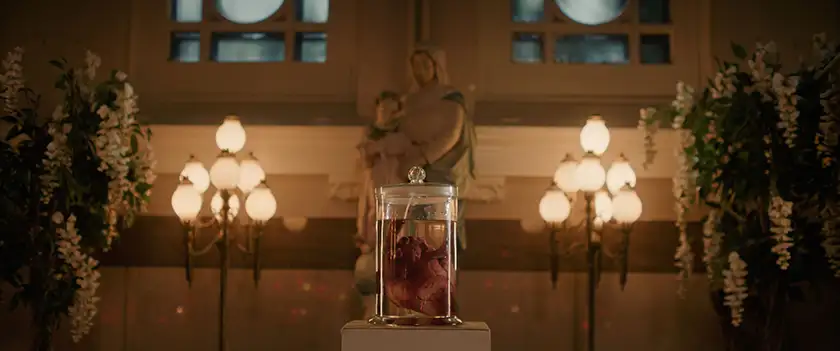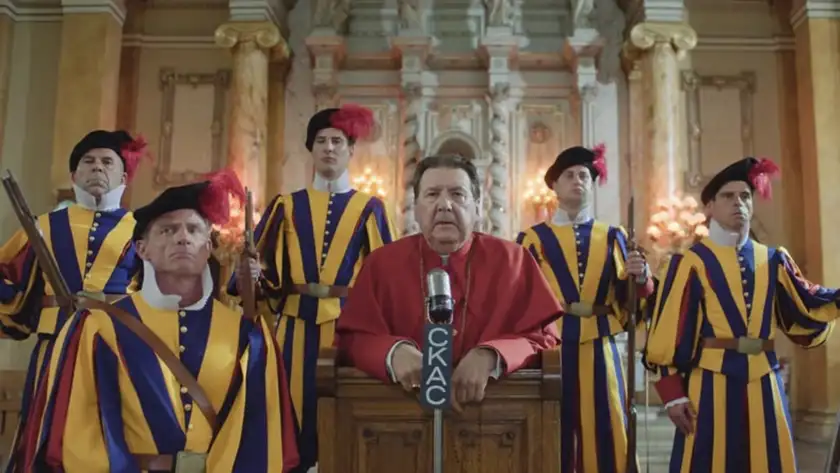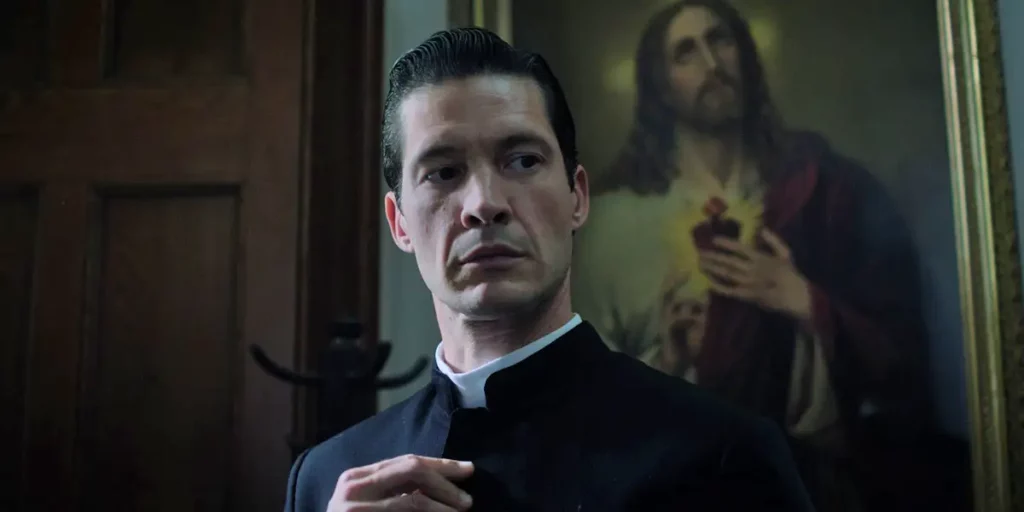In Ababouiné, André Forcier takes down the politics of the Maurice Duplessis era through a darkly comic lens and paves a new way forward.
Director: André Forcier
Genre: Comedy, Drama, Fantasy
Run Time: 94′
Fantasia Premiere: August 4, 2024
Canadian Release Date: August 23, 2024
U.S. Release Date: TBA
U.K. Release Date: TBA
It’s been a long time since André Forcier made something worthwhile. The 77-year-old filmmaker’s last great effort was almost twenty years ago, with The United States of Albert. After that, he’s been on a rather middling to disappointing streak, with his last movie, Forgotten Flowers, seeming too concerned with its surrealist imagery than mixing it with a compelling story and characters. With Ababouiné, which had its world premiere at the Fantasia International Film Festival in the Cheval Noir section, the surrealist images he’s mostly known for occur sparsely.
This gives Forcier the freedom to focus on the characters that populate the Faubourg à m’lasse, a neighborhood in Montreal that lives under strict catholic rule by Cardinal Madore (Rémy Girard). Madore and his vicar, Cotnoir (Éric Bruneau), control the neighborhood through their daily ‘Family Prayer’ session, and the faubourg’s only school while some of its residents clamor for the full separation between the Church and state. One of them is Michel Paquette (Rémi Brideau), a twelve-year-old boy crippled by Polio who longs for a life free from the shackles of religion, alongside Charlotte Saint-Amour’s (Lilou Roy-Lanouette) grandfather, Archange (Gaston Lepage).
Mr. Saint-Amour is a staunch supporter of the Refus Global manifesto, so much so that he carries an original copy with him. He also printed out a pamphlet on the support of secularism, to remove Catholicism in schools and the Bible in tribunals. It’s an ideology that will ultimately become dominant over the years, after premier Maurice Duplessis passes away and the Union Nationale slowly becomes irrelevant with the arrival of Jean Lesage, Daniel Johnson, Robert Bourassa, and René Lévesque in government.
But the era depicted in Ababouiné is not there yet, and we see first-hand just how controlling religion is as part of their everyday lives. Of course, some of it is exaggerated, including Madore’s army of Zouaves who scurry around the Montreal borough on their motorcycles with guns, who go into Saint-Amour’s shop to burn every copy of his pro-secularism pamphlet, or even threaten elementary school students at gunpoint, after one of them dares say “Long live a secular Quebec!” (“Vive le Québec laïque!”)
Then there’s the whole schtick involving the late Frère André’s heart, which is (truthfully) kept in the Saint-Joseph’s Oratory to view. It’s where Forcier operates at his most surreal, offering a bit where Paquette’s grandmother, Délima (Pascale Montpetit), has a vision of Frère André speaking through his heart as he tells her to use a special ingredient for her meatball stew. That entire vision scene had the audience in stitches, and it’s a type of reality detachment that could only be made by the filmmaker who brought us Au clair de la lune, Une histoire inventée and L’eau chaude, l’eau frette.

But the movie then begins to showcase the reality of the Church’s rule inside the district, including how Cotnoir lures young children into their lap, makes them believe they are special and have a close relationship, before he takes advantage of them. Forcier does not outright show any scenes of abuse, until one pivotal moment that shifts a character’s arc from a devout catholic to questioning their faith after they see someone being brutally molested without their consent. It’s the most striking image in all of Ababouiné, which isn’t afraid to expose how the catholic Church has gotten away with molesting children in Québec for so long. It also begins to ask difficult questions on how the faubourg’s connection to the ‘one father’ not only is a corrupted ideology, but corrupts the very souls of the people who feel they are protected by “the Eternal light” (as Maurice Duplessis would frequently say).
And in a team up worthy of any great Tales for All production, Paquette, Charlotte, “Le Matou” (played by Miguel Bédard, who has literal cat hands, but Forcier doesn’t have him say “Heille, c’est mon chat, tabarnak!” like in Jean Beaudin’s Le Matou, so that’s an immediate disappointment), and Angèle Moisan (Maïla Valentir) decide to take matters into their own hands and ensure Cotnoir and Madore will never abuse anyone ever again and take advantage of the faubourg’s pitiful economic state.
Forcier goes even darker with his final act, but he gives the protagonists the satisfaction that many actual victims of rape from the Catholic Church did not have. In that regard, he more than succeeds in making Ababouiné his most important film in ages, one that deftly takes down dominant ideologies that reduced the population to mindless sheep praising at a Catholic figure that abused of his power, while the ones who dared fight back were gaslighted, or even rejected, by their peers.
Yes, some of it doesn’t work. The entire subplot on finishing a book titled ‘Ababouiné’ may be the most unimpressive part of the whole thing, even if it acts as the film’s center (and title). But Forcier has more pressing things he must take off his chest before he goes back to ‘Ababouiné,’ which dilutes any impact it could’ve had if this was the movie’s focus. When the movie solely diverts its attention on the Catholic Church and the rise of secularism, it gives audiences a new perspective and understanding on why the Church no longer controls all aspects of government and education, and why state officials cannot promote religious activities while working.
Sure, it’s slightly far-fetched, but the abuse of children did happen, for countless years, and nothing was done for decades, until more victims are currently coming forward and telling their truths. And not just in Québec, but all over the world, including the Vatican, the so-called ‘holiest’ part of the world. Girard and Bruneau’s portrayals of Madore and Cotnoir may be caricatured, but they’re always in service of Forcier’s direction, and showcase exactly how many real-life priests managed to get away with facing justice before they passed away. It’s slightly funny (particularly a scene in which Cotnoir licks Madore’s feet, to express his devotion towards him), but gets even more frightening when we learn exactly how they operate.

The younger players are just as good, with Brideau completely stealing the show as Michel Paquette. We’ve not seen such a child actor make such an impression since the release of Bach et Bottine in 1986 and the chemistry he shares with the other children on-screen is to die for. It’s also why the movie works as well as it does: we ultimately care for the protagonists before they witness something their minds will never unsee. Forcier also brilliantly develops tight-knit community built in the neighborhood, from the drunk baseball pitcher (Luc Senay) to the CKVL radio host Léo Rondeau (Réal Bossé) and his boss, Eddie Vautour (Donald Pilon), who reminds everyone “No politics in a Catholic province!” (“Pas d’politique dans une province catholique!”)
Everyone has equal time to shine, and Forcier ensures each relationship is developed enough for it to be riveting to watch. His writing hasn’t been this sharp in ages, and it’s great to see the filmmaker not only raise awareness on a scandal that is slowly unearthing itself, but also being unafraid to discuss it with an often darkly humorous, and lightly surreal lens. He doesn’t take a pro or anti-stance on secularism, or makes audiences lead one way to another. However, he does ask pertinent questions on religion’s place within society when the institutions of power are themselves corrupted, and will forever be that way, if nothing is done to stop them from continuing their abuse. In turn, he makes the ultimate argument for social change, and showcases a new way forward, freed from the shackles of a corrupted Cardinal and Vicar who will never change in the face of such criminal allegations.
Blending surrealism with a deeply-rooted story on Québec identity (and, in this case, history), Forcier is well in his ballpark with Ababouiné, but with a smart penmanship we’ve not seen from him since 2005. If this is finally the movie that made Fantasia give him the Denis-Héroux Award for his contribution to the advancement of genre cinema in Québec, then he’s more than earned it. In any case, Forcier has forever solidified his place as one of the best filmmakers to have ever graced this province, and perhaps even cinema history as a whole. His movies are worth seeing, no matter which side of the fence you’ll end up on, because they make us think about our identity, through a visual treatment that is unlike anything that Québec cinema ever delivered on such a scale. He’s deserved this Fantasia recognition for a long while, and there’s hope he’ll release something even greater than Ababouiné much sooner than later.
Ababouiné premiered at the Fantasia Film Festival on August 4, 2024, where director André Forcier was the recipient of the Denis-Héroux Award.

